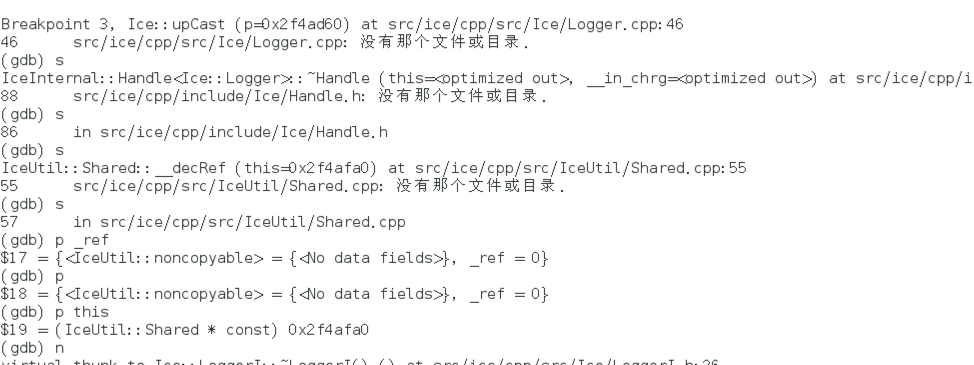Handle (p=0x0, this=0x7f2a2ff7bc00 <(anonymous namespace)::processLogger>)
at src/ice/cpp/include/Ice/Handle.h:42
42 src/ice/cpp/include/Ice/Handle.h: 没有那个文件或目录.
(gdb) bt
#0 Handle (p=0x0, this=0x7f2a2ff7bc00 <(anonymous namespace)::processLogger>)
at src/ice/cpp/include/Ice/Handle.h:42
#1 __static_initialization_and_destruction_0 (__initialize_p=1,
__priority=65535) at src/ice/cpp/src/Ice/Initialize.cpp:45
#2 _GLOBAL__sub_I_Initialize.cpp(void) ()
at src/ice/cpp/src/Ice/Initialize.cpp:538
#3 0x00007f2a3e22e1e3 in _dl_init_internal () from /lib64/ld-linux-x86-64.so.2
#4 0x00007f2a3e2328f6 in dl_open_worker () from /lib64/ld-linux-x86-64.so.2
#5 0x00007f2a3e22dff4 in _dl_catch_error () from /lib64/ld-linux-x86-64.so.2
#6 0x00007f2a3e231feb in _dl_open () from /lib64/ld-linux-x86-64.so.2
#7 0x00007f2a3dafdfbb in dlopen_doit () from /usr/lib64/libdl.so.2
#8 0x00007f2a3e22dff4 in _dl_catch_error () from /lib64/ld-linux-x86-64.so.2
#9 0x00007f2a3dafe5bd in _dlerror_run () from /usr/lib64/libdl.so.2
#10 0x00007f2a3dafe051 in dlopen@@GLIBC_2.2.5 () from /usr/lib64/libdl.so.2
#11 0x00007f2a3cb7122f in _PyImport_GetDynLoadFunc ()
from /usr/lib64/libpython2.7.so.1.0
#12 0x00007f2a3cb59b3e in _PyImport_LoadDynamicModule ()
from /usr/lib64/libpython2.7.so.1.0
#13 0x00007f2a3cb57c41 in import_submodule ()
from /usr/lib64/libpython2.7.so.1.0
#14 0x00007f2a3cb57e8d in load_next () from /usr/lib64/libpython2.7.so.1.0
#15 0x00007f2a3cb5886e in PyImport_ImportModuleLevel ()
from /usr/lib64/libpython2.7.so.1.0
---Type <return> to continue, or q <return> to quit---
#16 0x00007f2a3cb3bb1f in builtin___import__ ()
from /usr/lib64/libpython2.7.so.1.0
#17 0x00007f2a3caab8e3 in PyObject_Call () from /usr/lib64/libpython2.7.so.1.0
#18 0x00007f2a3cb3d6f7 in PyEval_CallObjectWithKeywords ()
from /usr/lib64/libpython2.7.so.1.0
#19 0x00007f2a3cb423b5 in PyEval_EvalFrameEx ()
from /usr/lib64/libpython2.7.so.1.0
#20 0x00007f2a3cb46e3d in PyEval_EvalCodeEx ()
from /usr/lib64/libpython2.7.so.1.0
#21 0x00007f2a3cb46f42 in PyEval_EvalCode ()
from /usr/lib64/libpython2.7.so.1.0
#22 0x00007f2a3cb56d2c in PyImport_ExecCodeModuleEx ()
from /usr/lib64/libpython2.7.so.1.0
#23 0x00007f2a3cb56fa8 in load_source_module ()
from /usr/lib64/libpython2.7.so.1.0
#24 0x00007f2a3cb57c41 in import_submodule ()
from /usr/lib64/libpython2.7.so.1.0
#25 0x00007f2a3cb57f26 in load_next () from /usr/lib64/libpython2.7.so.1.0
#26 0x00007f2a3cb5886e in PyImport_ImportModuleLevel ()
from /usr/lib64/libpython2.7.so.1.0
#27 0x00007f2a3cb3bb1f in builtin___import__ ()
from /usr/lib64/libpython2.7.so.1.0
#28 0x00007f2a3caab8e3 in PyObject_Call () from /usr/lib64/libpython2.7.so.1.0
---Type <return> to continue, or q <return> to quit---
#29 0x00007f2a3cb3d6f7 in PyEval_CallObjectWithKeywords ()
from /usr/lib64/libpython2.7.so.1.0
#30 0x00007f2a3cb423b5 in PyEval_EvalFrameEx ()
from /usr/lib64/libpython2.7.so.1.0
#31 0x00007f2a3cb46e3d in PyEval_EvalCodeEx ()
from /usr/lib64/libpython2.7.so.1.0
#32 0x00007f2a3cb46f42 in PyEval_EvalCode ()
from /usr/lib64/libpython2.7.so.1.0
#33 0x00007f2a3cb56d2c in PyImport_ExecCodeModuleEx ()
from /usr/lib64/libpython2.7.so.1.0
#34 0x00007f2a3cb56fa8 in load_source_module ()
from /usr/lib64/libpython2.7.so.1.0
#35 0x00007f2a3cb57c41 in import_submodule ()
